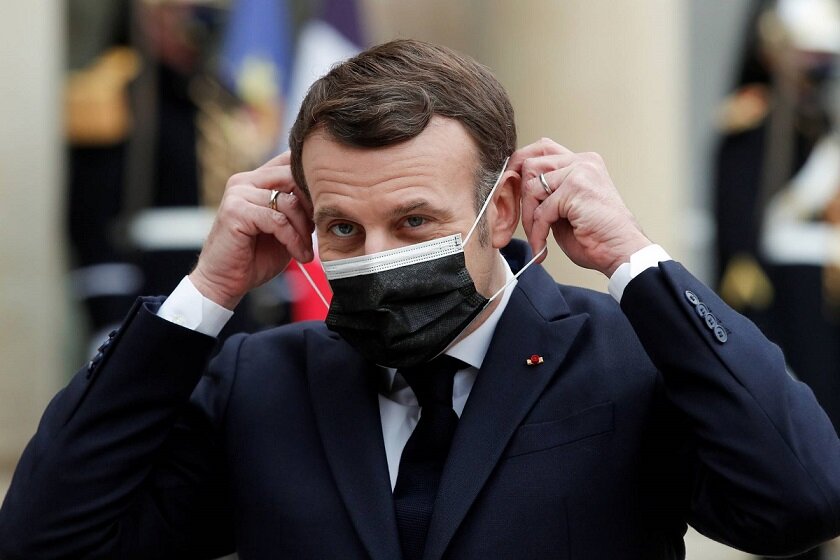Macron’s gambit

TEHRAN – French President Emanuel Macron has once again called for broader negotiations with Iran and involvement of Iran’s archrivals in the negotiations, a stance that could derail the very much anticipated talks between Iran and the West even before they go ahead.
In a repetition of his last week’s remarks that elicited a strong response from Iran, the French president called for a “new negotiation” with Iran to address thorny issues such as Iran’s defensive missile program and its regional activities. He said Saudi Arabia and Israel should be involved in such negotiations while expressing readiness to play the role of “honest broker” in facilitating these negotiations.
“I do welcome a willingness to re-engage a dialogue with Iran. And this is a common challenge for peace and security in [the] Middle East [West Asia]. I will do whatever I can to support any initiative from the U.S. side to re-engage demanding dialogue. I will be here, where I was available one and a half years ago to try to be an honest broker, a committed broker in this dialogue. But I do believe that we do need to finalize indeed a new negotiation with Iran,” Macron said in a conversation with the Atlantic Council on Thursday.
He pointed out that U.S. President Joe Biden would have a “critical role” in the negotiation with Iran for two reasons: first, because Iran is allegedly closer to developing a nuclear weapon than it was before the signing of the 2015 nuclear deal.
“Second, because we have to address the ballistic missile issue and we have to address the stability of the region. This is a comprehensive agenda. This needs to be negotiated now because this is the right timing,” Macron claimed.
He added, “We have to find a way to involve in this discussion Saudi Arabia and Israel because they are some of the key partners of the region directly interested in the outcome.”
The comments, which were unsolicited, come amid heated debates in foreign policy circles in the U.S. and Europe about how to deal with the Iran nuclear deal, officially known as the Joint Comprehensive Plan of Action (JCPOA).
During his election campaign, Joe Biden had vowed to rejoin the JCPOA on the condition that Iran resumes strict compliance with the deal. He reaffirmed this position after winning the U.S. presidential election in November. However, the new U.S. president has refused to articulate his strategy in this regard.
Meanwhile, France along with Germany and the UK have sought to strike a tough tone on Iran in a bid to revive the JCPOA and “improve” it in the process, something Iran strongly opposes.
In addition, France has moved to include Saudi Arabia and Israel in the coming negotiations between Iran and the West, a move that will not only endanger the renewed diplomatic efforts to revive the JCPOA but will highly likely kill the deal in its entirety.
While Biden officials vaguely said that the U.S. will consult with its regional allies before rejoining the JCPOA, France went so far as to include these allies in the upcoming nuclear negotiations even though Iran has voiced opposition to such an idea.
Following last week’s comments of Macron on the need to involve Saudi Arabia in the expected nuclear talks between Iran and the West, a senior Iranian lawmaker strongly rejected the comments.
“Saudi Arabia has nothing to do with the nuclear agreement,” Abolfazl Amouei, the spokesman for the Iranian Parliament’s National Security and Foreign Policy Committee, told the Qatari-owned Al Arabi Al Jadid newspaper, declaring Iran’s opposition to the inclusion of Riyadh in any possible talks with the parties to the JCPOA.
Macron is expected to pay a visit to Saudi Arabia soon, where he will most likely discuss the issue of reviving the JCPOA. If he does so, he will be throwing a wrench in the works of the Biden administration’s efforts to resuscitate the JCPOA even before they start simply because Iran has said time and again that it will not accept any expansion of the nuclear talks’ format.
Whether Macron would proceed with his idea remains an open question. It may turn out to be an opening gambit aimed to extract more nuclear concessions from Iran or simply set the stage for a broader negotiation with Iran, but either way, he will complicate things and make them more difficult than ever.
Also, it remains to be seen whether France would succeed in convincing other JCPOA parties and the U.S. into pursuing its agenda. On Friday, the foreign ministers of France, Germany, the UK, and the U.S. held a meeting to discuss issues related to the JCPOA.
Regardless of what the foreign ministers discussed in the Friday meeting, any effort to expand the deal or add new members to it will be counterproductive.
Comments